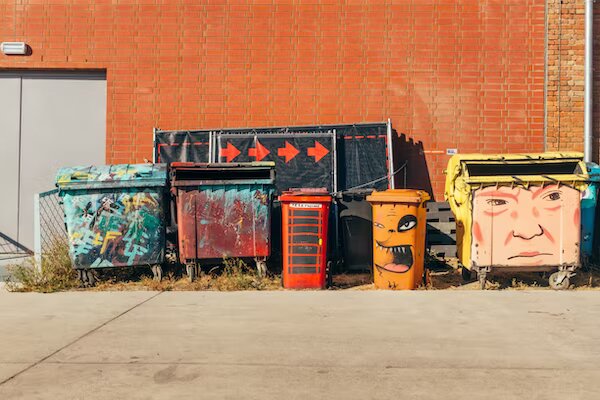By Russ Robertson
The first thing I want to say is I am not talking about food stuff. The second thing is, that in the city I live our garbage is placed out front of our houses. By putting something in the same area as the weekly garbage it is safe to assume that it is up for grabs.
Dumpster diving, also known as urban foraging or bin diving, is the act of scavenging through trash containers, dumpsters, or bins in search of items that have been discarded but that may still be useful or valuable. Some people engage in dumpster diving as a way to find clothing or other household items that they can use or sell. Others do it as a way to reduce waste and help the environment by rescuing items that would otherwise end up in a landfill. One saves money, of course, and one helps the environment. Both are good reasons to walk your neighborhoods looking for old, but useful, treasures.
Dumpster diving can be controversial, as it might be considered a form of theft or trespassing, although if the items are discarded, the original owners are indicating they are giving up their claim on the items. It has, in fact, been legal in all 50 states since 1988, according to a ruling from the Supreme Court [1]. By Federal law, if the trash can or bag has been put out on the curb, it’s legal to retrieve something from it. Just be careful not to go on private property and definitely don’t make a mess during your search – littering is not only unneighborly, it’s against the law. Check your local laws, as well, for any city or county ordinances that prohibit dumpster diving – I live in Tampa Bay, and it’s ok where I live [2]. You can also ask a household member if it’s ok to take something that’s been discarded. I have done this many times, if I am not sure. Some people also worry about the health risks associated with handling discarded items, but you can stay safe by sticking to larger items that don’t fit in a garbage can, like furniture. I would also suggest wearing gloves, just to be sure. However, many dumpster divers argue that we are simply taking advantage of resources that would otherwise go to waste, and that we are helping to reduce the amount of garbage that ends up in landfills.
I have found numerous items on the side of the road that have been very helpful to me in my endeavors to be sustainable. To use things and repair things instead of buying new is a great way to save money and save the environment. For instance, I found an old dresser on the side of the road that I know was going to the dump and I looked at the handles and I absolutely fell in love with them. Turns out these handles were 60 years old, and though not very valuable, they were very elegant! When I remodeled my kitchen I used them, and they are a showpiece in my new kitchen
Another time I found old dresser drawers that worked perfectly, and I fashioned them into a shelving unit. Just because somebody is throwing it out doesn’t make it junk.
Trying to live sustainably isn’t only worrying about what you throw out as much as it is also worrying about what others throw out. If we want to decrease our carbon footprint, we must be diligent about the way we think about sustainability. On this same train of thought, it’s important to look at things as if they can be fixed, not replaced. As a long-time environmentalist, I think the one thing that drives me over the brink is the common verbiage of “two-year disposable property.” I know that there are many economics majors who would go on and on and on regarding that two-year disposal property is good for the economic well-being of our country, because it reproduces products blah blah blah. Instead, why not fix it? Don’t throw it away, repair it – don’t give up on it! If it served you well for four years, see if you can fix it. I had a Mr. Coffee coffeepot that lasted us for six years. I didn’t want to get a new one … I could set this one up in the morning without even looking at it. Eventually, after six years, it gave up the ghost. Even then, I tried to fix it, but I couldn’t. Maybe next time!
In the past we reused everything. Maybe it’s time to think like that again.
Original image by Moondance from Pixabay
References
- Dumpster Diving (FindLaw, 2022) See https://www.findlaw.com/injury/torts-and-personal-injuries/dumpster-diving.html#:~:text=Dumpster%20diving%20is%20technically%20legal,%2C%20county%2C%20or%20state%20ordinances.
- Is Dumpster Diving Illegal in Florida? (Treasure Pursuits) See: https://treasurepursuits.com/is-dumpster-diving-illegal-in-florida/
